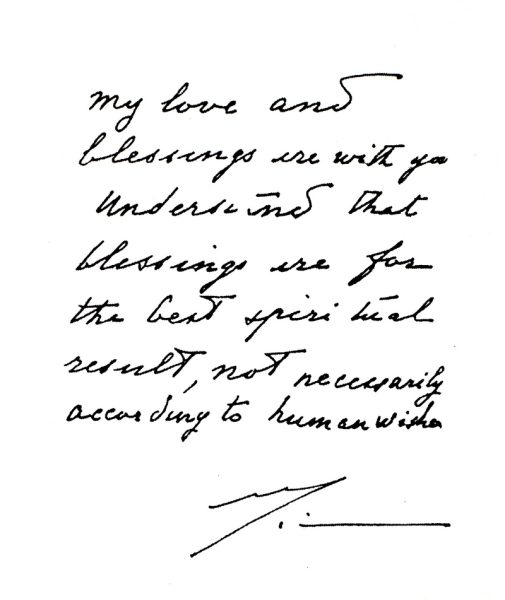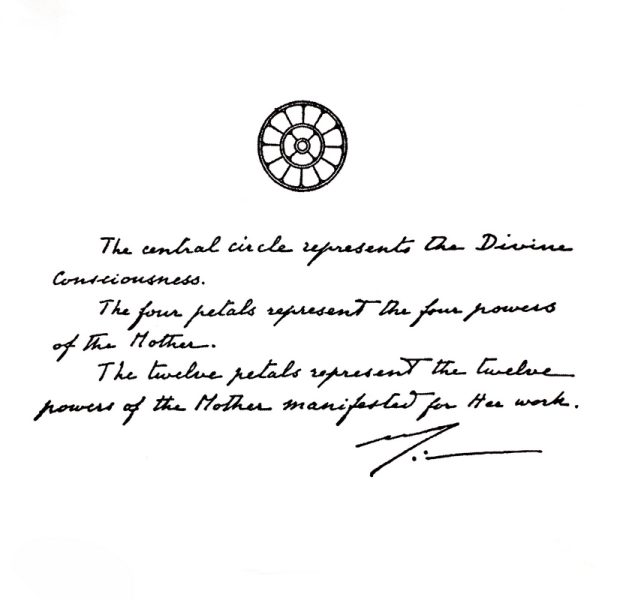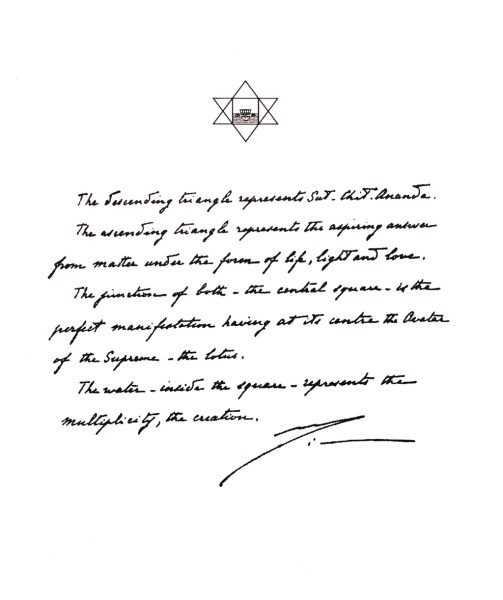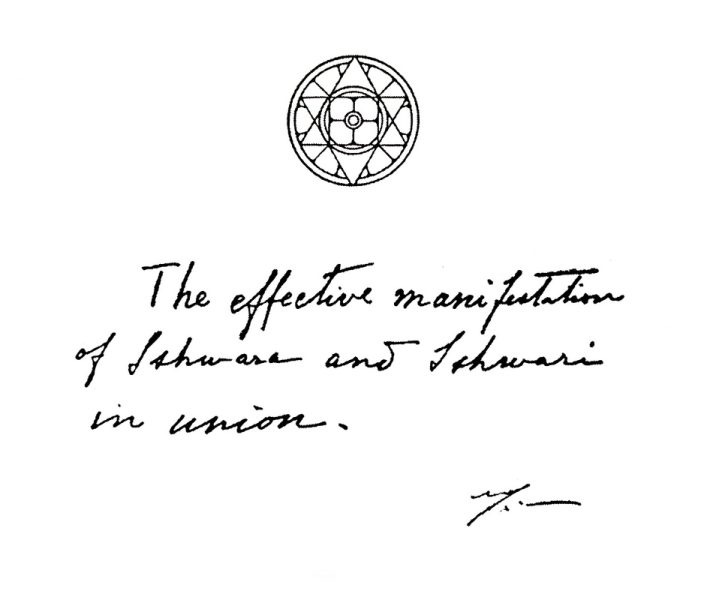The Mother’s Blessings
My love and blessings are with you. Understand that blessings are for the best spiritual result, not necessarily according to human wishes.
The Mother
My blessings are very dangerous. They cannot be for this one or for that one or against this person or against that thing. It is for, or well I will put it in a mystic way:
It is for the Will of the Lord to be done, with full force and power. So it is not necessary that there should always be a success. There might be a failure also, if such is the Will of the Lord. And the Will is for the progress, I mean the inner progress. So whatever will happen will be for the best.
The Mother
21 January 1960
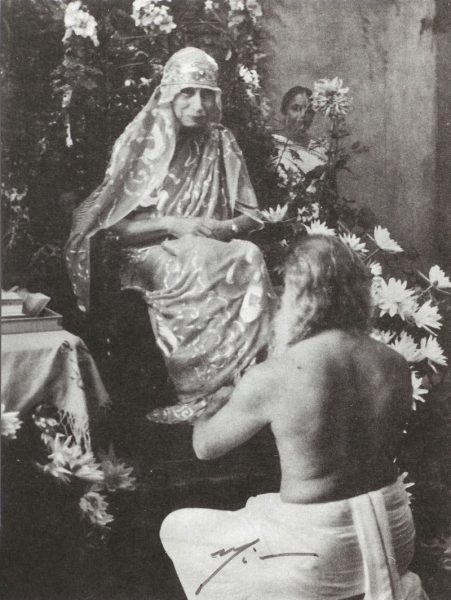 The Mother with Champaklal and Kamala
The Mother with Champaklal and Kamala
Blessing’s Packets
There are some petals, flower petals, inside, but they are charged with force, and if you keep them upon you, the contact with me is kept. So if you refer inside, you can establish the contact and have even an answer.
The Mother
Let him keep this envelope in his pocket and look at the picture when he feels depressed.
Blessings.
The Mother
The Mother’s Signature
The Mother used to write her full name only on documents:

M. Alfassa
Otherwise, she would normally sign notes, letters and messages:
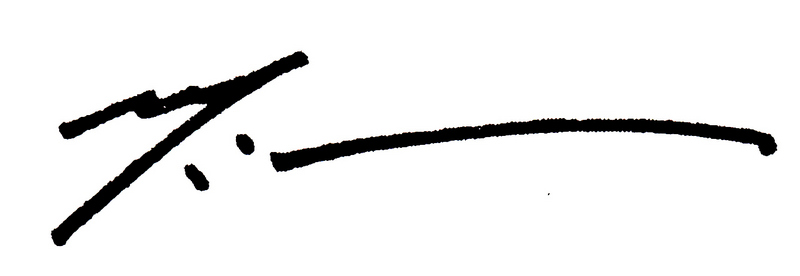
Where only an initial was enough, she wrote:

Prayers Given to Sadhaks
A Prayer
Let this year that begins for me, be the beginning of a new life made of unshakable faith and trust in the Divine and of a constant aspiration.
The Mother
February 1934
(Mantram for Pandit)
In the name of my Lord,
for the sake of my Lord,
with the will of my Lord,
by the power of my Lord,
stop immediately harassing us.
The Mother
(Prayer for the children of Dortoir Boarding)
We all want to be the true children of our Divine Mother.
But for that, sweet Mother, give us patience and courage, obedience, good will, generosity and unselfishness, and all the necessary virtues.
This is our prayer and aspiration.
The Mother
15 January 1947
(To Madanlal)
My Lord, make me entirely thine.
The Mother
Grant me a quite trust, a peaceful strength, an ardent faith and devotion.
The Mother
My Lord, my Mother,
You are always with me with your blessings and your grace —
Your presence is the supreme protection.
“My Lord, grant me this quiet trust in Thee which overcomes all the difficulties.”
A prayer for Gunvant, with love and blessings
The Mother
Lord, give me this Grace to never forget you.
The Mother
17 December 1958
Lord, give me perfect sincerity, that sincerity which will lead me straight to Thee.
The Mother
August 1962
(The words of the music)
Lord, give me the real happiness, that which depends only upon Thee.
The Mother
A grain of practice is worth a mountain of theories.
Lord, on this anniversary day of my birth, grant that the power to know changes in me into a power to transform myself integrally.
The Mother
O my Lord
With your help and grace what is there to fear!
You are the supreme protection that defeats all the enemies.
The Mother
O Lord
Let Thy will be done
Thou art the Supreme and perfect protection.
The Mother
Lord, grant that my vision of things may be direct and objective and my acts be completely transformed by it.
The Mother
Remember that the Mother is always with you. Address Her as follows and She will pull you out of all difficulties:
“O Mother, Thou art the light of my intelligence, the purity of my soul, the quiet strength of my vital, the endurance of my body. I rely on Thee alone and want to be entirely Thine. Make me surmount all obstacles on the way.”
The Mother
Lord, grant that a stupidity once committed and recognised may never be repeated.
The Mother
Message for the Opening of a House
(Dahyabhai)
Let this new house be filled with an ardent aspiration for the Divine Realisation and in answer to the call the Divine Presence will be there.
The Mother
7 October 1951
Pens and Pencils
When writing materials like fountain pens, ball-pens and pencils were offered to the Mother, she would often try them immediately. Here is what she wrote about five pencils tried out on a piece of paper:
the good pencil
a nice pencil
another nice pencil
a still better pencil
the perfect pencil
Symbols
The Mother’s Symbol
The central circle represents the Divine consciousness.
The four petals represent the four powers of the Mother.
The twelve petals represent the twelve powers of the Mother manifested for Her work.
The Mother
Centre and 4 powers white. The 12, all of different colours in three groups (1) top group red passing through orange towards yellow, (2) Next group yellow passing through green towards blue, (3) blue passing through violet towards red. If white is not convenient, the centre may be gold (powder).
Sri Aurobindo
20 March 1934
Sri Aurobindo’s Symbol
The descending triangle represents Sat-Chit-Ananda.
The ascending triangle represents the answer from matter under the form of life, light and love.
The junction of both the central square — is the perfect manifestation having at its centre the Avatar of the Supreme — the lotus.
The water — inside the square — represents the multiplicity, the creation.
The Mother
Symbol of the Sri Aurobindo International Centre of Education
The effective manifestation of Ishwara and Ishwari in union.
The Mother
Sanskrit Names Given by
Sri Aurobindo and the Mother
अभी — Abhi (the bold)
Narottam’s son
The Mother
अभिनव Abhinava (The new one)
Son of Mangal Sikka
1 July 1959 The Mother
आहूत Ahuta (The called)
Son of Srikrishnaprasad
9 November 1960 The Mother
अन्तर्ज्योति Antarjyoti (Inner Light)
Mahabeer
2 October 1961 The Mother
अनुरक्त Anurakta (Lovingly devoted)
Tony Scott
16 November 1961 The Mother
आशातीत Ashatita (Unexpected)
(The son of Amolokchand)
16 July 1959 The Mother
आस्था Astha (Trust)
Mounnou’s sister
13 July 1960 (8.48 P.M.) The Mother
अस्तु Astu
(Son of Sourin Ganguli)
The Mother
आत्मवदन Atmavadan (The face of the Self)
Chandra’s son
born on the 14th September 1960
at 12.55 The Mother
अवधानी Avadhani (Careful)
The Mother
आवि Avi (Square, manifestation of balance)
Born on 6 June 1966 The Mother
अविशेष Avisesha (Beyond the definite)
Ajay
The Mother
आयति Ayati (l’avenir)
The Mother
भागवत Bhagavata
Jiveshwara
22 November 1959 The Mother
भूप्रिय Bhupriya
A name for Murakoshi (Paul)
9 July 1956 The Mother
चान्द Chand (Moon)
Chhotanarayan’s son
The Mother
चेता Cheta (Awake)
Madan’s baby
9 June 1957 The Mother
चिन्मयी Chinmayi Chit, the pure spirit consciousness.
Chinmayi, one who is full or all made of the pure spirit consciousness.
Sri Aurobindo
चिन्तन Chintan (Pensif)
Son of Shyam Sundar
The Mother
दारा Dara
A name born in ancient times
(Given to Ibrahim)
To Dara
There were two Emperors of Persia named Darius (Dara). The first was Darius Hystaspes, the greatest of his dynasty, and the other Darius Codomanus, the last of the line who was conquered by Alexander.
It is the first whose name you bear.
Sri Aurobindo
दत्त Datta (The dedicated)
Grandchild of Rassendren
The Mother
दत्ता Dattā (The dedicated)
Grandchild of Rassendren
The Mother
देवदत्त Devdutt (Offered to the Divine)
Byankatraman
The Mother
धीमती Dhimati
Udar’s aunt
The Mother
द्विज Dwija (The twice-born)
Tarachand
11 May 1958 The Mother
धुमन Dyuman (The Luminous one)
Sri Aurobindo
हर्ष Harsha (Happiness)
Rini’s daughter
17 January 1961 The Mother
हुता Hutā (The offered one)
Savita
The Mother
इषित Ishit (Willed for)
Urmi’s child
20 November 1962 The Mother
इति Iti (The last)
17 November 1954 The Mother
ज्योतिप्रिया Jyotipriya (The lover of light)
Sri Aurobindo
कनिष्ठा Kanishtha (The youngest)
Ananda Umachigi
The Mother
किम Kim
Babu
Lakshman Reddy’s Son
23 October 1959 The Mother
कोमल Komal (Delicate)
Ramakrishna Jain’s daughter
20 November 1960 The Mother
ललिता Lalita (Beauty of refinement and harmony.
This is the idea underlying the word. It is also the name of one of the companions of Radha.)
Sri Aurobindo
नप्ता Napta (Grandchild or protector)
Mamata’s grandchild
1 November 1960 The Mother
नवजात Navajāta (The new born)
12 September 1954 The Mother
निरता Nirata (Dévouement sincere)
4 June 1951-4 June 1961 The Mother
निष्ठा Nishtha (The name means one-pointed fixed
and steady concentration, devotion and
faith in the Divine Realisation.)
5 November 1938 Sri Aurobindo
प्रपत्ति Prapatti (Surrender)
- C. Pati
1 May 1960 The Mother
पुलका Pulakā (Cheerful)
Kabi Sicka
13 September 1961 The Mother
ऋजुता Rijuta (Straightforward)
To Patricia
21 May 1960 The Mother
सहजा Sahadja (Spontanée)
Christiane
26 November 1956 The Mother
सहाया Sahaya (Helpful)
Toshiko
8 January 1957 The Mother
सफल Saphala (The successful)
Shyamsundar’s son
11 May 1958 The Mother
सरस्वती Saraswaty
The Mother
सत्प्रेम Satprem (The true love)
Bernard
3 March 1957 The Mother
सौमित्र Saumitra
Werner
Blessings
22 October 1958 The Mother
शान्तिकाम Shantikama (Aspiring for peace)
8 February 1960 The Mother
शान्तिकर Shantikar
(2nd son of Dayakar)
June 1955 The Mother
श्रीमयी Srimayi (Toute-beauté)
Varvara
8 December 1958 The Mother
सुबोधा Subodha (Awaken)
With blessings
Gertrude
3 July 1958 The Mother
सुधीरा Sudhira
The name means one who is quiet, serious in mood, firm-willed and steadfast in action and purpose. (To Zahara, Ibrahim’s sister, is given the name Sudhira)
Sri Aurobindo
सुखी Sukhi (Happy)
Rambhai’s grandson
5 April 1960-1961 The Mother
सुखिता Sukhita (Comfortable)
18 September 1962 The Mother
सुकृति Sukriti (Fulfilment)
Grand-nephew of Madanlal Himatsinghka
The Mother
सुव्रता Suvrata (Madame Gaebele)
Sri Aurobindo
स्वागत Swāgata (“Welcome”)
Bam’s son
2 October 1957 The Mother
स्वागता Swāgatā
(pour Ressendran)
The Mother
तन्मय Tanmaya (Wholly His)
Jean Raymond
23 August 1962 The Mother
उदार Udara
Noble, generous, upright and sincere.
26 April 1938 Sri Aurobindo
To Udar
With blessings Sri Aurobindo
The Mother
उज्ज्वल Ujjvala (Bright)
Sita’a son
15 July 1957 The Mother
उत्सुक Utsuka (Curious)
Son of Bijon’s daughter
The Mother
उत्तमा Uttamā (The ultimate, the last, the best)
Kishori’s youngest daughter
28 May 1960-1961 The Mother
विजया Vijaya “Conquest”
19 January 1933 Sri Aurobindo
यतन्ती Yatanti (Persevering)
Tony
6 May 1960 The Mother
Development of Qualities
The four S. that Subhadra must develop:
Sincerity
Simplicity
Silence
Steadiness
The Mother
Satyen
The Four S —
I propose for your realisation:
Sincerity
Simplicity
Straightforwardness
Steadiness
The Mother
Instructions to Sadhaks of the Ashram
(The following instructions were circulated in the Ashram during the first few years of its existence. The first short notice is by Sri Aurobindo, the last is by the Mother. The other two longer notices seem to have been formulated by Nolini Kanta Gupta, the Secretary of the Ashram, following the oral or written indications of Sri Aurobindo and the Mother. Some of the rules in them were written by Sri Aurobindo or else taken almost verbatim from his letters.)
Rules and Regulations of the Ashram
After a careful study of the Ashram, nothing short of spiritual intensity is needed for the conquest over the greed for food.
Sri Aurobindo
27 November 1929
1. Always behave as if the Mother was looking at you; because she is indeed, always present.
2. All new-comers and persons connected with them are hereby informed that every new arrival to the Ashram is to be reported to Purani on the same day in order to furnish information for the Police.
3. There have been several instances recently in which members of the Ashram have been rude and overbearing in their behaviour to the French Police when they come to the Ashram in connection with the registration of new arrivals. There can be no possible excuse for this kind of conduct, especially as the police authorities have agreed to our own proposals in the matter and we have undertaken to help them with all necessary information. Sri Aurobindo has already given a warning against making trouble for the Ashram with the authorities; it ought not to be necessary to repeat it.
Especial care must be taken during these days when many are arriving from outside. If the police come for information, they must not be sent rudely away; they should be asked to wait and information be given to Purani who will deal with the matter.
4. Food and other requirements are given in the Ashram to those who have made a complete surrender of their means to the Mother and receive only what she gives them. If anyone receives money from outside and keeps it, it will be understood that he wishes to live on his own independent means and does not need anything from the Ashram and arrangements will be made accordingly.
5. Furniture purchased by a temporary inmate for personal use remains a property of the Ashram when he leaves the place. He cannot take it with him nor claim it back when he comes again.
6. Nothing should be sent out for publication (contributions to newspapers and Magazines or books) without having been first submitted to Sri Aurobindo for approval.
7. Sri Aurobindo’s work is purely spiritual. Anyone entering the Ashram as a member must abstain from political connections or activities.
8. The moment one enters the life of the Ashram and takes up the Yoga he ceases to belong to any creed or caste or race; he is one of Sri Aurobindo’s disciples and nothing else. Race prejudices, caste feeling, pride of sect or contempt of other religions have no place here. Every sadhak should remember this in his thought and speech and dealings with the others.
9. Visitors from outside should not be received in the Ashram by the sadhaks except under special circumstances and by permission. Infringement of this rule may have very inconvenient consequences for the work.
10. Nothing should be spoken to outsiders as to what passes in the Ashram without special permission from the Mother.
11. Outsiders should not be allowed within the precincts of any of the houses of the Ashram. If anyone wishes to see the Ashram, it can be done only after special permission from the Mother.
12. Rule No. 4 applies only to permanent members of the Ashram. Those who stay only for a time must contribute to the expenses a monthly sum to be fixed by the Mother.
13. Permanent members of the Ashram are expected to undertake some part of the work necessary for its organisation and maintenance. The nature of the work to be given to them will be decided by the Mother. Those who reside temporarily may also assist while they are here.
14. This Ashram, maintaining almost a hundred people, has to be run at a heavy expense; it is therefore the understanding that while those who have nothing (the majority) are admitted free and nothing is asked from them, the few who have something are expected to give what they have. If they wish to have the charge of their whole spiritual and material future taken over by us, it is at least fair that they should make the offering of all their possessions.
Early 1930s
It has been found necessary to change some of the forms and methods hitherto used to help by external means, the individual and collective sadhana. This has to be done especially in regard to the consecration of food, the collective meditation and the individual contact of the sadhak with the Mother. The existing forms were originally arranged in order to make possible a spiritual and psychic communion on the most physical and external planes, by which there would be an interchange of forces, a continuous increase of the higher consciousness on the physical plane, a more and more rapid change of the external nature of the sadhaks and afterwards an increasing descent of the supramental light and power into Matter.
Meditation at 7 a.m. on all days of the week except Wednesday and Friday. Flower offering on Tuesday and Thursday, none on Saturday, Sunday and Monday.
All fixed or daily times for sadhaks seeing the Mother are cancelled. Every day the Mother will call those whom she wants to see. Any others who need to see her, will inform Nolini early in the morning or the night before, and write the reason for their request which will be acceded to or otherwise dealt with, according to circumstances and possibilities.
The soup will be distributed in the evening in the downstairs verandah of Sri Aurobindo house. All who taste it must be present at 8.30 and remain seated in silence till the Mother comes. Before the distribution there will be few minutes’ concentration all together.
The night meditations are cancelled for a time.
On the first of each month, the distribution from the stores will be made in the store room, in the presence of the Mother, at 8 p.m.
Early 1930s
The Ashram is meant for Yoga, not for musical entertainments, or other social activities.
Those that live in the Ashram are requested to live quietly and noiselessly, and if they are not capable themselves of meditation, they must at least leave the others to meditate.
The Mother
A Poem of Radhananda Corrected by Sri Aurobindo
Radhananda‘s original poem:
Why burnest thou, O fire, within my soul?
Cheated by hope I sink beneath the strain
Of thy divinity that has allured
With its huge promise of unearthly goal
This human, yea, too human self of mine!
Too long have I thy scorching bliss endured,
Too long the ecstasy of godstruck pain!
Madden not thus my failing flesh and mind —
For mercy’s sake, tell me what Might divine
Has blown the blaze of thy effulgent wind
Into my life?
What immortality
Beckons thee forward, guides thee from behind,
O Shining Shadow of Dark Mystery?
Poem as corrected by Sri Aurobindo:
Why burnst thou thus, O fire, within my soul?
Baulked of my hope I sink beneath the strain
Of the divinity that has allured
With the vast promise of its far off goal
This human, O, too human self of mine!
Thy scorching bliss I have too long endured,
Too long this ecstasy of godstruck pain!
Madden not thus my failing flesh and mind —
Have pity, let me feel the Might divine
That blew thy blaze on some effulgent wind
Into my life. What immortality
Beckons thee on or guides thee from behind,
O Shining Shadow of that Mystery?
Sri Aurobindo’s comments on the poem. The numbers in the left column refers to the lines of the original poem.
1. Rhythm weak.
2. “Cheated” is too common and violent to be in tune with the style of the poem.
3. “The” gives a larger idea than “thy” and avoids a rather awkward construction of the syntax.
4. “Promise of unearthly goal” is not English. “An” or “its” is needed before the adjective — in the latter case the first “its” has to go. “Huge” gives a sense of uncouthness which it is not your intention to give.
5. Yea is archaic and rhetorical.
6. I alter the order both to get rid of an awkward inversion and to give a more natural turn to the repetition of “too long”. To put the object between the subject and the verb should be avoided — it can only rarely be used and then only in order to get an unusual and powerful effect. On the other hand to put the object at the beginning for the sake of emphasis is permissible.
7. “For mercy’s sake” is impossibly colloquial, — it cannot be used in poetry.
8. You cannot speak of “the blaze of a wind” — the phrase is too violent.
9. “Or” is indispensable here for smoothness in the sense.
10. “Dark” is out of place, it gives a sense of something sad and adverse. “That” referring back to “Might Divine” and indicating some supreme rahasyam would be much more poetic and profound.

